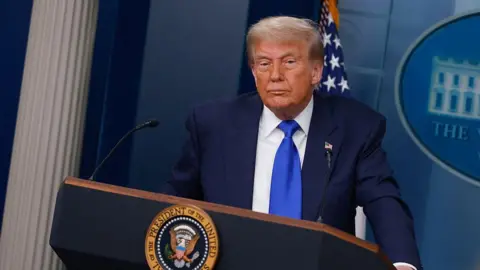Judge blocks Trump's birthright order after Supreme Court ruling
 Getty Images
Getty ImagesA US judge has once again blocked President Donald Trump from implementing an executive order ending birth right citizenship for some US residents as a legal challenge moves forward.
A New Hampshire judge approved a class action lawsuit against Trump's executive order, and temporarily stopped the president's order from taking effect.
The class action lawsuit was brought by the American Civil Liberties Union on behalf of immigrant parents and their infants.
The decision comes weeks after the Supreme Court introduced limits on how and when universal injunctions are issued by federal courts. However, the decision still allows them through certain legal avenues.
The class action suit was introduced after the Supreme Court decision, in keeping with the new standards set by the court.
Still, the White House challenged the validity of the judge's ruling.
"Today's decision is an obvious and unlawful attempt to circumvent the Supreme Court's clear order against universal relief. This judge's decision disregards the rule of law by abusing class action certification procedures," spokesman Harrison Fields said in a statement Thursday. "The Trump Administration will be fighting vigorously against the attempts of these rogue district court judges to impede the policies President Trump was elected to implement."
The US Constitution guarantees citizenship to all born on US soil, but Trump has sought to revoke that right for babies born to undocumented immigrants and foreign visitors, as part of his crackdown on immigration.
The class-action lawsuit seeks to challenge the order as harmful and unconstitutional, and the judge ruled that it can proceed on behalf of the babies who would be affected by the restrictions.
The ruling also once again pauses an order that was a priority for Trump. The judge has given the government seven days to appeal.
Restricting birthright citizenship was one of his first actions in office.
Multiple courts across the US issued nationwide injunctions as they considered legal challenges to the order.
The Trump administration appealed those temporary holds to the highest US court, arguing judges did not have the authority to block a presidential order nationally while the courts considered the cases.
The Supreme Court's conservative majority sided with Trump in a 6-3 ruling that broadly curtailed judicial power, though the justices did not address the constitutionality of Trump's birthright citizenship order.
Following the Supreme Court's decision, Trump's order had been set to take effect on 27 July.
